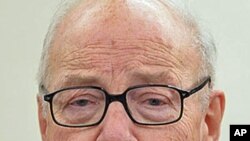A historic visit by the U.S. Secretary of State Hillary Clinton to Burma is seen as a prelude to improving relations between Washington and Naypyidaw. But, for that to happen, the Burmese government may need to reveal details of past covert dealings with North Korea.
President Barack Obama has said he is sending his secretary of state to Burma to see how the United States can help the country support progress on political reform, human rights and national reconciliation. But Mr. Obama also has said Burma's relationship with North Korea is a major issue that needs to be addressed.
U.S. Senator Richard Lugar, from the state of Indiana, who is the ranking Republican member on the Foreign Relations Committee, is calling for any re-engagement with Naypyidaw to include a full disclosure of “the extent and intent of the developing Burmese nuclear program.
The senator says his committee received information, five years ago, that the Burmese government intended to develop nuclear weapons, with the help of North Korea.
A year ago, United Nations investigators released a report accusing North Korea of supplying prohibited nuclear and ballistic equipment to Burma, Iran and Syria, surreptitiously, to avoid international sanctions.
Burma, also known as Myanmar, is a signatory to the Nuclear Non-Proliferation Treaty and a member of the International Atomic Energy Agency. According to International Crisis Group senior analyst Daniel Pinkston, that means the Burmese must come clean on any previous dealing with the North Koreans.
"If there's clear evidence of nuclear cooperation - then, to improve ties with the U.S. and the rest of the international community, Burma would have to fulfill its obligations under the NPT and under its safeguards agreement with the IAEA [International Atomic Energy Agency]. And, that would mean disclosing any past nuclear cooperation with the DPRK [North Korea], any acquisition of materials, technologies, components and so forth," Pinkston said.
Diplomats and intelligence analysts also point to unconfirmed reports of hundreds of North Korean engineers and scientists visiting or working at Burmese military or other facilities. But South Korean government officials, speaking to VOA on the condition they not be identified, say they have seen no concrete evidence of that level of cooperation between North Korea and Burma.
Former IAEA director general Hans Blix, who now chairs the Weapons of Mass Destruction Commission, concurs with that assessment, in regards to a purported Burmese nuclear weapons development program.
"The world has reasons to be worried and inquire about it. There was some defector who spoke about it, but others who discounted it pretty solidly. And, my experience was that they [North Korea] had not come very far," Blix said.
Burmese officials have also denied any pursuit of nuclear weapons, although acknowledging they have considered trying to use atomic technology to produce electricity. Earlier this year, Burmese officials stated their country was too poor to pursue any type of nuclear program.
Evidence of conventional arms trafficking between Burma and North Korea over the years is more concrete. On numerous occasions, The U.S. Navy has prevented North Korean ships, suspected of carrying weapons, from reaching Burmese ports. Analysts say the North Koreans appear to have helped Burma advance its missile capabilities.
Analysts note that any successful previous deliveries could pose diplomatic complications for Burma as it seeks to normalize relations with the international community. Under the United Nations Security Council resolutions imposed on Pyongyang, all exports and purchases of North Korean weapons, including conventional arms, are also banned.
Burma-North Korean relations have had a rocky history since their establishment in 1962. Burma cut ties with Pyongyang, in 1983, after North Korean agents in Burma tried to assassinate South Korea's president. The bombing killed 18 high-ranking South Korean officials.
Military ties between Burma and North Korea appear to have resumed in the early 1990s, but the diplomatic relationship was not officially restored until four years ago.
For decades, both countries have been isolated from much of the diplomatic community and global trade because of their repressive governments.
US Outreach to Burma May Prompt Fuller Disclosure of North Korea Ties




